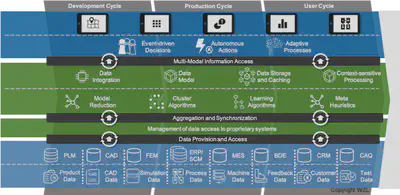
The Internet of Production (IoP) pursues the vision of enabling a new level of cross-domain collaboration by sharing available semantically adequate and context-related data from development, production, and use in real time, even globally across participants of the IoP.
Within the cluster of excellence, COMSYS participates in two areas:
- As part of CRD-A “IoP-Infrastructure”, COMSYS contributes to develop an infrastructure for the IoP considering the functional, physical, and conceptual perspective for Digital Shadows in Production.
In particular, Prof. Wehrle coordinates the Workstream A.I “Physical Infrastructure Supporting Digital Shadows” with the vision of providing the physical foundation for the IoP by supporting the execution and transfer of production models and data flows within and across layers with high performance, low latency, and security. The main research objectives COMSYS focuses on are (i) a seamless low-latency analysis and execution of physical, simulated, and data-driven models towards a holistic analysis in all production domains through adaptive control operations within network infrastructures and (ii) to guarantee data security, data sovereignty, and stakeholder confidentiality in industrial collaboration scenarios within a global lab of labs with mutually distrustful stakeholders. - As part of CRD-B2 “Production Technology”, COMSYS contributes to integrate reduced and composed heterogeneous engineering models across production domains into situation-specific real-time data analytics.
COMSYS also participates in the interdisciplinary expert group “Digital Shadow Enablers” to advice and enable all IoP research institutions to create, utilize, and manage data repositories suitable for highly heterogeneous structured, semi-structured and unstructured data to facilitate the creation of digital shadows.
Contact: dse@ima.rwth-aachen.de
More specific information is available on the official cluster website. The funding initially runs from 2019 to 2025.